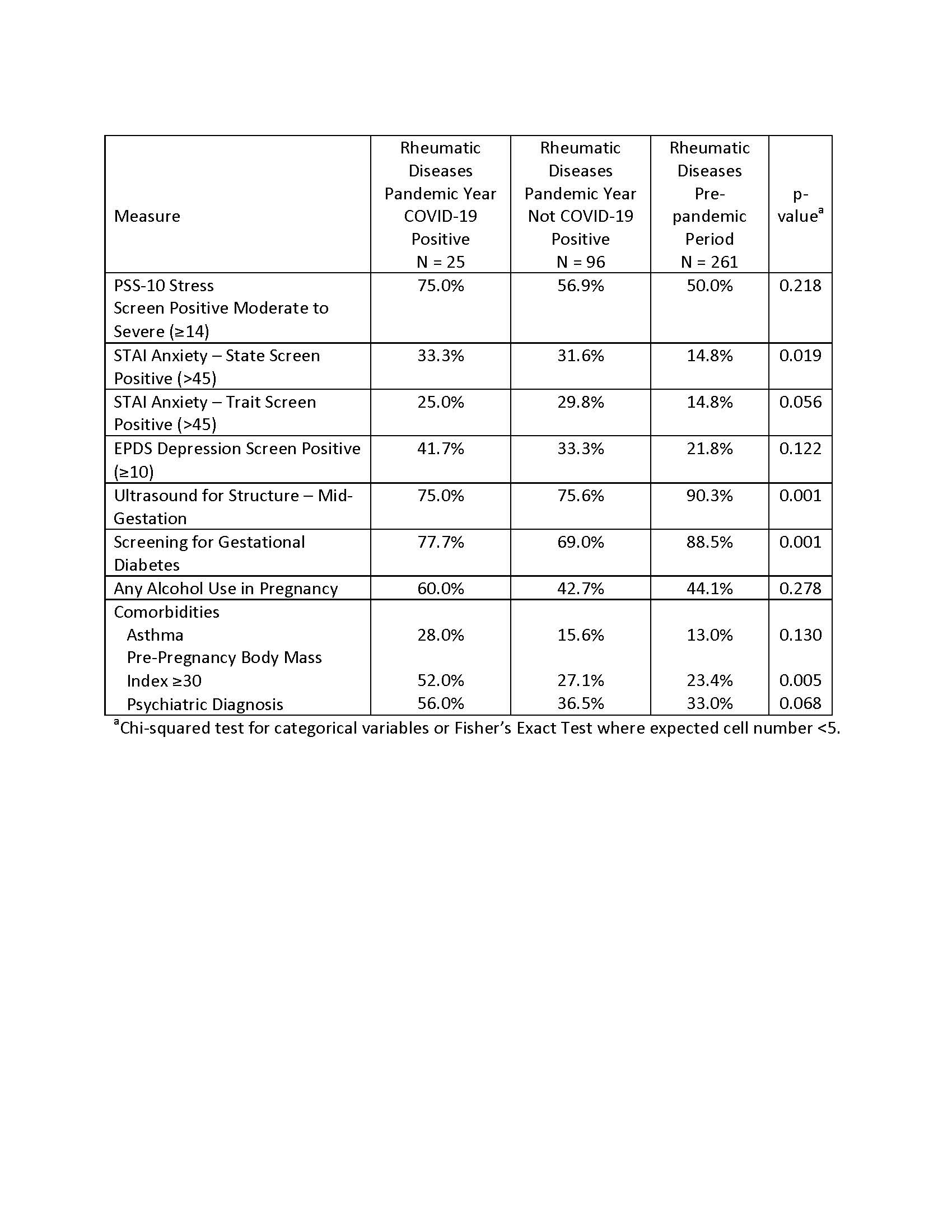Session Information
Date: Tuesday, November 9, 2021
Title: Reproductive Issues in Rheumatic Disorders Poster (1711–1731)
Session Type: Poster Session D
Session Time: 8:30AM-10:30AM
Background/Purpose: Pregnant women with rheumatic diseases may have been particularly vulnerable to the various consequences of the current pandemic, whether or not they were infected with SARS-CoV-2. Some of these consequences include increased stress, anxiety and depression, substance use, and reduced compliance with prenatal care, all of which could negatively impact pregnancy outcome. In addition, comorbidities may present increased risk of infection in women with underlying rheumatic diseases.
Methods: As part of the ongoing OTIS/MotherToBaby Autoimmune Diseases in Pregnancy Project, between February, 2017, and February, 2021, 382 pregnant women with rheumatic diseases were enrolled. The study assessed comorbidities, administered standardized measures of stress (PSS-10), anxiety (STAI state and trait) and depression (EPDS) mid-gestation or at enrollment if later than mid-gestation, captured maternal report of recreational substances used anytime in pregnancy, as well as compliance with routine prenatal care procedures such as ultrasound scans for structure and screening for gestational diabetes. From the onset of the pandemic, COVID-19 test positive status at any time in pregnancy was assessed. Those enrolled in the pre-pandemic period (N = 261) were compared to those enrolled in the pandemic year (N = 121), stratified by COVID-19 test positivity in pregnancy.
Results: As shown in the Table, compared to the pre-pandemic period, pregnant women with rheumatic diseases were more likely to screen positive on state or trait anxiety. Screening positive on stress or depression was more common in those women who were infected compared to other groups, but not significantly so. Similarly, alcohol use was increased only among those with rheumatic diseases in the pandemic year who tested positive for COVID-19 in pregnancy. Pregnant women with rheumatic diseases who had a pre-pregnancy body mass index in the obese range (≥30) were significantly more likely to test positive for the virus in the pandemic year.
Conclusion: These data suggest that pregnant women with rheumatic diseases were particularly vulnerable during the pandemic year to complications that could influence pregnancy outcome.
 Table. Characteristics of pregnant women with rheumatic diseases before and during the SARS-CoV_2 pandemic.
Table. Characteristics of pregnant women with rheumatic diseases before and during the SARS-CoV_2 pandemic.
To cite this abstract in AMA style:
Johnson D, Dave H, Luo Y, Chambers C. Pandemic-Associated Complications in Pregnant Women with Rheumatic Diseases [abstract]. Arthritis Rheumatol. 2021; 73 (suppl 9). https://acrabstracts.org/abstract/pandemic-associated-complications-in-pregnant-women-with-rheumatic-diseases/. Accessed .« Back to ACR Convergence 2021
ACR Meeting Abstracts - https://acrabstracts.org/abstract/pandemic-associated-complications-in-pregnant-women-with-rheumatic-diseases/
